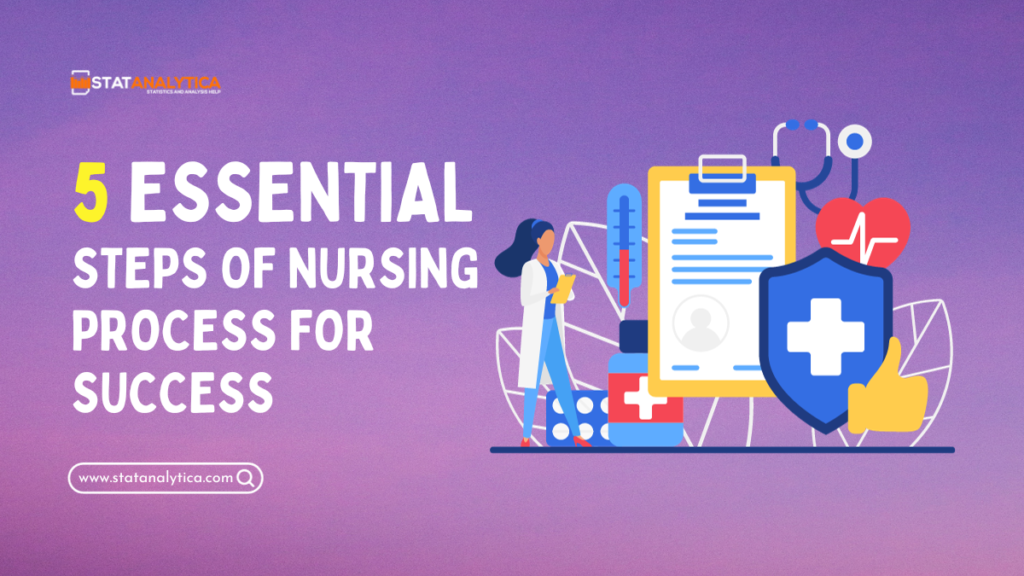Welcome to the insightful journey through the steps of nursing process. Imagine you’re at the heart of healthcare, where nurses play a crucial role in caring for people. Ever wondered how nurses bring compassionate care to life? It all starts with a systematic guide called the nursing process. Think of it as their roadmap, leading them through each step to deliver the best care possible.
Picture this a nurse’s day begins with gathering information about a patient’s health. After that forming a bond through understanding and listening. Then comes the part where they assess the situation, spotting what needs attention. Next up, they plan what to do and how to do it, considering everything from treatments to comfort.
Nurses put their plans into motion, applying treatments and providing support. Finally, they evaluate how things are going, making adjustments if needed. These steps aren’t just a routine they’re a compass guiding nurses. Helping to provide top quality care for everyone they help. Join us in exploring these essential steps of the nursing process.
What Is Nursing ?
Table of Contents
Nursing is a vital profession dedicated to caring for individuals, families, and communities. This profession contributes in promoting health and well-being. It’s a blend of science and compassion. Nurses provide total care, like addressing physical needs but also offering emotional support.

Understanding The Concept Of Nursing
After understanding what is nursing now it it time to have a clear understanding of a nurse’s profession. For this purpose we have listed them as:
Range of Responsibilities
- Assessing patients’ health conditions
- Administering medications
- Providing treatments
- Educating individuals about their health
- Acting as patient advocates for optimal care
- Collaborating closely with doctors and healthcare professionals
Building Connections and Understanding
- Forming meaningful connections with patients
- Listening and understanding patient concerns
- Providing comfort and empowerment
- Supporting informed decision-making for patients’ health
Diverse Work Settings
- Working in hospitals, homes, schools, and communities
- Contributing to healthcare system efficiency
- Improving health outcomes through diverse settings
- Engaging in research and advocating for better health policies
- Upholding commitment to serving others and improving healthcare efficiency
5 Core Steps Of Nursing Process
Nursing is all about taking care of people when they are sick or need help staying healthy. Nurses are like superheroes in hospitals, clinics, and even at homes. They help doctors, give medicines, and make sure everyone feels comfortable and safe. Nursing is a profession which requires due care and awareness. Here are steps of nursing process:

1. Assessment
The first step in nursing is assessment. In it nurses gather lots of information about someone’s health. It’s like detectives collecting clues but in a hospital or clinic. Nurses use different ways to get this information. Like asking questions, checking how someone looks or feels, and doing checks.
This step is important because it helps nurses understand condition of person’s health. It’s like putting together a puzzle to figure out the best way to help. Nurses pay close attention to details and ask questions to make sure they know everything needed to give the best care . This way, they can create a plan to help the person feel better or stay healthy.
2. Diagnosis
Nurses carefully analyze all the information they collected during the assessment. They look for patterns, signs, and clues. For identifying any health issues or potential problems the person might have. It’s about finding out what’s making the person sick or what help they might need to stay healthy.
This step helps nurses decide the best ways to help. It’s not just about naming an illness but understanding what the person needs and how nurses can support them. Once they’ve figured it out, nurses can plan and start the right care to make things better for the person.
3. Planning
After nurses gather all the information and figure out what might be going on. The next step in the nursing process is planning. This step is like mapping out a journey towards better health for the person they’re caring for.
During planning, nurses create a roadmap for care. They set specific goals based on what they found during the assessment and diagnosis. These goals are like destinations they want to reach to improve the person’s health.
Nurses plan out the steps they need to take to reach those goals. They prioritize what needs to be done first and outline the specific actions and treatments needed to help the person get better. It’s like planning out the best route to follow to reach a destination.
This phase is all about designing a personalized care plan. It’s not just about treating an illness but about supporting the person as a whole. It is done by taking into account their needs and what will work best for them. Planning ensures that the care provided is effective, and tailored to improve health.
4. Implementation
In the nursing process, after nurses have done assessment, made a diagnosis, and planned out the best care, it’s time for implementation. This step is like putting the plan into action, making things happen to help the person feel better.
Nurses take all the plans they’ve made and start doing what’s needed to care for the person. This involves giving medicines, performing treatments, and providing the support as per plan. It’s like the moment when all the preparation turns into action.
During implementation, nurses are hands-on, delivering care with skill and compassion. They administer medications, perform procedures, provide comfort as outlined in the care plan. They closely monitor the person’s response, making sure everything is going as planned. Also timely adjustments are made if needed.
It’s a crucial step where the plans and intentions become a reality. Nurses make a difference in the health and well-being of the person they’re caring for. Implementation is aiming to help the person get better and feel supported in their healthcare journey.
5. Evaluation
In the nursing process, evaluation is like the check-up at the end of a journey. After nurses have assessed, diagnosed, planned, and implemented care, it’s time to see how things went and whether the goals were achieved.
During evaluation, nurses look at how the person responded to the care provided. They compare the results to the goals set at the beginning of the care plan. It’s a bit like looking back to see if the plan made things better or if there’s still more that can be done.
This step involves assessing whether the person’s health improved, if they achieved the goals set in the care plan, or if there are any changes or adjustments needed. Nurses consider if the care was effective and if the person’s needs were met.
Evaluation is crucial as it helps nurses learn and adjust. If the goals weren’t met, nurses figure out why and make changes to the plan to better help the person. It’s a continuous process of learning and improving, ensuring the best possible care.
How To Become A Nurse?
The demand for nurses is ever-growing. As it offers stability and diverse opportunities for growth and advancement. It’s a career that offers incredible versatility. Nurses can work in various settings like hospitals, clinics, schools, or even in the community. They can specialize in different areas. Here is a complete guide on how to become a nurse:
#1 Education
You’ll need to earn a nursing degree. There are different paths, including:
- Associate Degree in Nursing (ADN): Typically a two year course.
- Bachelor of Science in Nursing (BSN): A four year degree offered at universities.
- Nursing Diploma: Offered by hospitals and takes about 3 years.
These are the educational options you can opt for being a nurse in future.
#2 Get Licensed
After completing your education, you need to pass the NCLEX-RN exam to become a registered nurse (RN). This exam tests your nursing knowledge and skills.
#3 Gain Experience
Many nursing roles require some experience. You can start as a staff nurse in hospitals, clinics, or other healthcare settings to gain practical experience.
#4 Consider Specialization
Nurses can specialize in areas like pediatrics, oncology, critical care, etc. This often involves further education or certification.
#5 Continuing Education
Nursing is a field that’s constantly evolving, so continuing education and staying updated with new practices and technologies is important.
#6 Develop Soft Skills
Compassion, communication, problem-solving, and adaptability are crucial in nursing. Developing these skills enhances your effectiveness as a nurse.
#7 Meet Requirements
Depending on the state or country, there might be additional requirements for licensure or renewal.
Conclusion
This journey through the steps of nursing process reveals the caring path nurses follow to help others. From assessing health to making plans, giving care, and checking how it’s going, these steps are like a guidebook for nurses to provide the best help possible. Becoming a nurse involves learning, passing a test, gaining experience, and always learning more.
It’s about caring, listening, and helping people when they’re sick or need support. Nursing isn’t just about fixing bodies; it’s about supporting hearts and minds too. So, whether it’s assessing health or becoming a nurse, it’s all about compassion and learning to make a real difference in people’s lives.


